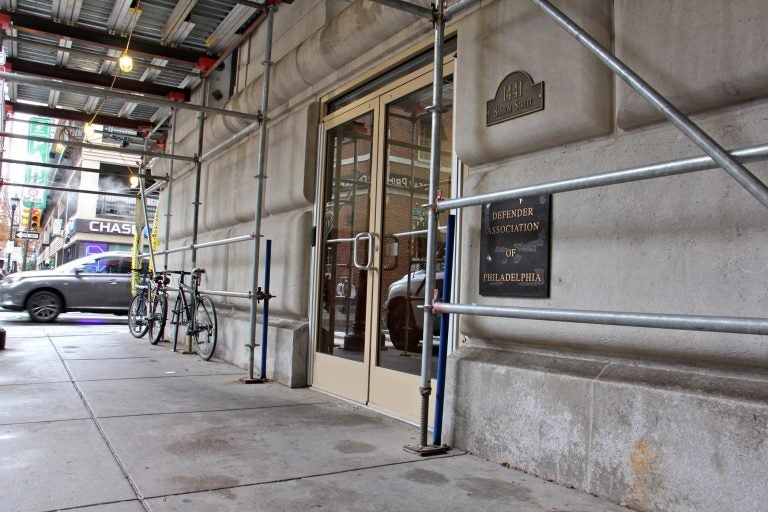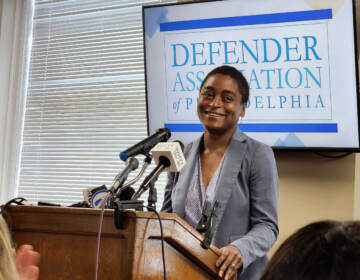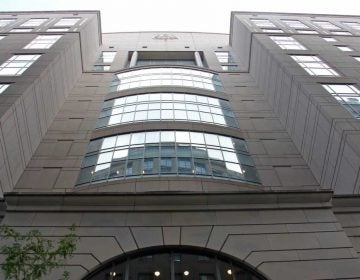Philly public defenders move for union vote after management skips voluntary recognition
The union, which would represent about 200 lawyers, said it’s holding out hope for a new proposal from management — but it’s still filing for an NLRB election.

File photo: The building at 1441 Sansom Street is home to the Defender Association of Philadelphia. (Emma Lee/WHYY)
Philly’s public defenders will vote to decide whether to unionize their workplace after informal negotiations with management stalled.
The Defenders Union had sought to win voluntary recognition from management over the past month, but the Defender Association of Philadelphia declined to grant the request at this time, according to statements from the union and the organization’s 27-member board.
“We are disappointed to share that management and the Board of Directors have not chosen to recognize the Defenders Union at this time,” the union said in a press release. “Instead, we were presented with a new proposal that may lead to voluntary recognition.”
That new proposal included holding a third-party vote, according to a statement provided by the board to WHYY.
“The Organizing Committee has declined to accept our proposal at this time, but has agreed to engage in further dialogue as we move forward,” board member Paul Hetznecker wrote. “The Defender Association of Philadelphia has, and will always support the rights of employees to unionize and collectively bargain for better working conditions.”
The proposed union, which would include roughly 200 lawyers, declined that option, per its statement. While noting it would “continue to engage in discussion” with management, the union said it “can no longer delay” filing for a formal election under National Labor Relations Board guidelines.
NLRB elections require a simple majority vote to win legal recognition for a proposed workplace union. In early December, the union said it was moving forward with the support of a majority of attorneys. Sources indicated that support has “steadily increased” since that time.
Though today’s board meeting did not result in voluntary recognition, the union said it will “will continue to engage in discussion” with chief defender Keir Bradford-Grey and the association board.
Public defenders represent nearly 7 of every 10 people arrested on criminal charges in Philadelphia — those who can’t obtain or afford their own attorneys.
The Friday afternoon decision comes about six weeks after defender employees announced their intent to seek representation from the United Automobile Workers, a manufacturing workers’ union that also represents legal aid groups. A statement released by the Defender Union in December said employees had decided to unionize in order to win “a greater voice in the decision-making processes” and “more opportunities for professional growth and development.”
Survey: Unionized defenders earn up to $15,000 more
The Defender Association of Philadelphia is a publicly-funded nonprofit employs 240 public defenders. These lawyers represent about 70% of all individuals arrested for criminal offenses or probation violations in Philadelphia, at no cost to the client.
The office receives the majority of its $46 million budget directly from City Hall, but operates as an independent organization for legal reasons. Mayor Jim Kenney did not immediately respond to a request for comment, but earlier released a statement in support of the union effort, describing himself as a “strong supporter of workers’ rights.”
The unionization effort in Philadelphia comes on the heels of similar movements in other cities.
In New York City, about 300 legal aid workers joined unions in the first half of 2019. While voluntary recognition for a collective bargaining arrangement is not unprecedented, it is unusual –– New York’s legal aid workers, as well as offices in cities like Chicago and Los Angeles, all unionized through an election process.
In Philadelphia, groups like Community Legal Services, which provides aid for clients in civil cases, organized long ago. An informal cohort calling itself the “Philadelphia Public Interest Legal Organization Transparency Project” has published self-reported salaries from lawyers at both union and non-union legal aid groups in the city. These showed unionized staff earning about $10,000 to $15,000 more, on average, than their non-union peers.
Statistics compiled by the New York-based Association of Legal Aid Attorneys, a pro-union group, indicate that nearly 50% of public defenders “leave before their tenth year of service in pursuit of higher wages.”
This is a developing story and will be updated as additional information becomes available.
WHYY is your source for fact-based, in-depth journalism and information. As a nonprofit organization, we rely on financial support from readers like you. Please give today.





